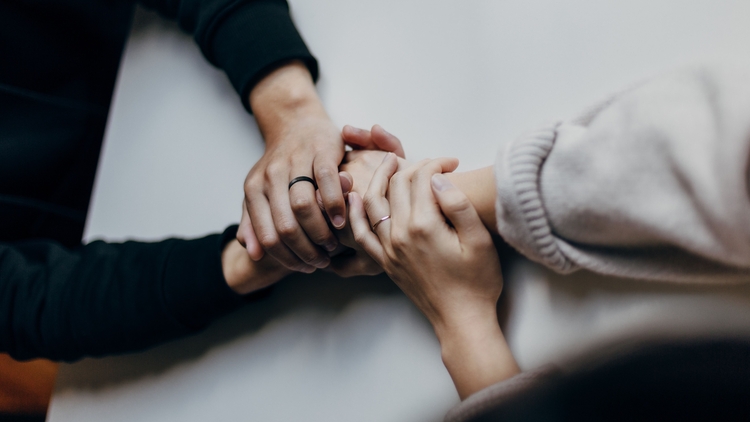From physical symptoms of blood cancer itself to treatments and their side effects, the experience puts a patient’s body through a lot. But how does cancer affect you emotionally?
Bottom line: Learning that you or someone you love has a serious illness is scary.
It reaches beyond blood tests: You might feel hopeless, irritable, or lose interest in things you once enjoyed. That’s why taking care of your mind, just as much as your body, is crucial when you’re facing blood cancer.
Processing your emotions and thoughts can help make the road after diagnosis less overwhelming. And whether you’re a patient, caregiver, family member, or friend, The Leukemia & Lymphoma Society (LLS) can help.
Staying Connected Is Key
Blood cancer can be an isolating experience, on multiple levels:
-
Lack of community: It can be a struggle to find others who understand what you're going through, whether you’re a patient or their loved one.
- Treatment safety: Because certain blood cancer treatments suppress the immune system, blood cancer patients are vulnerable and have to have fewer or no visitors.
- Personal coping: A cancer diagnosis can provoke many difficult emotions—including increased anxiety and depression.
In fact, between 15 to 25 percent of cancer patients are diagnosed with depression. But that doesn’t have to be the case. Studies show that when people have more social interactions and feel connected to others, they are less likely to develop anxiety or depression.
Start by asking yourself: who in your life do you feel supported or seen by? Even if you haven’t spoken to them recently, chances are that they want to help—they just don’t know how. Try reaching out and see what happens.
LLS also offers places of community and connection for anyone impacted by blood cancer:
- LLS Community is an online forum where patients and caregivers can connect with others in their situation and share helpful resources.
- Our live weekly Online Chats are moderated by a social worker and organized by cancer type or role (e.g., caregiver, young adults) for ease.
- Peer-to-peer volunteers are matched to patients and caregivers based on similar experiences—so the person you’re talking to knows what you’re going through.
- Blood cancer Information Specialists are highly trained oncology social workers and nurses who can assist you one-on-one through treatment, financial, and social challenges.
For Help, Hit the Books
Talking about your state of mind means being vulnerable—and you might not feel like opening up, on top of what you’re experiencing. That’s okay! Instead, maybe start by reading up on how blood cancer affects your mental health. LLS has a library of material, including some focused specifically on mental health, to get you going.
Start here to learn about and cope with the emotional effects of blood cancer:
- Mental Health — an overview of how blood cancer affects mental health
- Managing Stress: How stress affects you and ways to cope — providing tips and exercises for stress management
- Each New Day — taking the days after diagnosis one at a time
- A Teen’s Guide to Everything Cancer
- Caregiver Workbook — focused specifically on cancer caregiver support
If You Learn Better by Listening...
Are you a podcast or audiobook fanatic? If so, you might find it easier to explore mental health through audio. LLS’s podcast, The Bloodline, regularly hosts medical experts, patients and survivors, and others in the blood cancer community. We also have a series of webcasts covering various aspects of the social-emotional side of a cancer diagnosis.
From promising treatment updates to interviews with people living through and with blood cancer, we’re here for you.
Here are a few episodes we recommend on the topic of mental health:
- Cancer and Mental Health: Dr. Marni Amsellem, a clinical psychologist working with those adjusting to a cancer diagnosis, discusses the disease’s emotional effects.
- Psycho-Oncology: Caring for Body and Mind: Elizabeth Harvey, PhD, explains this relatively new field and the support needed to help someone cope with their cancer experience.
- How Will My Child’s Cancer Diagnosis Impact Their Emotions?: This episode touches on helpful resources and emotional support for families of cancer patients who are younger.
- Cafecito con LLS: Hablemos de la Salud Mental — this Spanish-language webcast focuses on mental health among blood cancer patients, as well as loved ones and caregivers.
When In Doubt, Reach Out
No one should have to carry the weight of blood cancer alone. LLS is here for you at every step after a diagnosis.
Talk one-on-one with a blood cancer Information Specialist who can assist you through blood cancer treatment as well as financial and social challenges—giving accurate, up-to-date disease, treatment and support information.
Our Blood Cancer Information Specialists are highly trained oncology social workers and nurses located in the U.S. and are available Monday to Friday, 9am-9pm ET, at (800) 955-4572.
There are also countless other organizations ready to help. You can find a handy list here.
References
Manis, Emily. “Study Suggests High-Quality Social Interactions Can Protect against Depressed Mood.” PsyPost, April 30, 2022. https://www.psypost.org/2022/04/study-suggests-high-quality-social-interactions-can-protect-against-depressed-mood-63047.
Waichler, Iris. “Cancer & Depression: Connection, Risks & Treatment.” Choosing Therapy, April 17, 2023. https://www.choosingtherapy.com/cancer-depression/.
